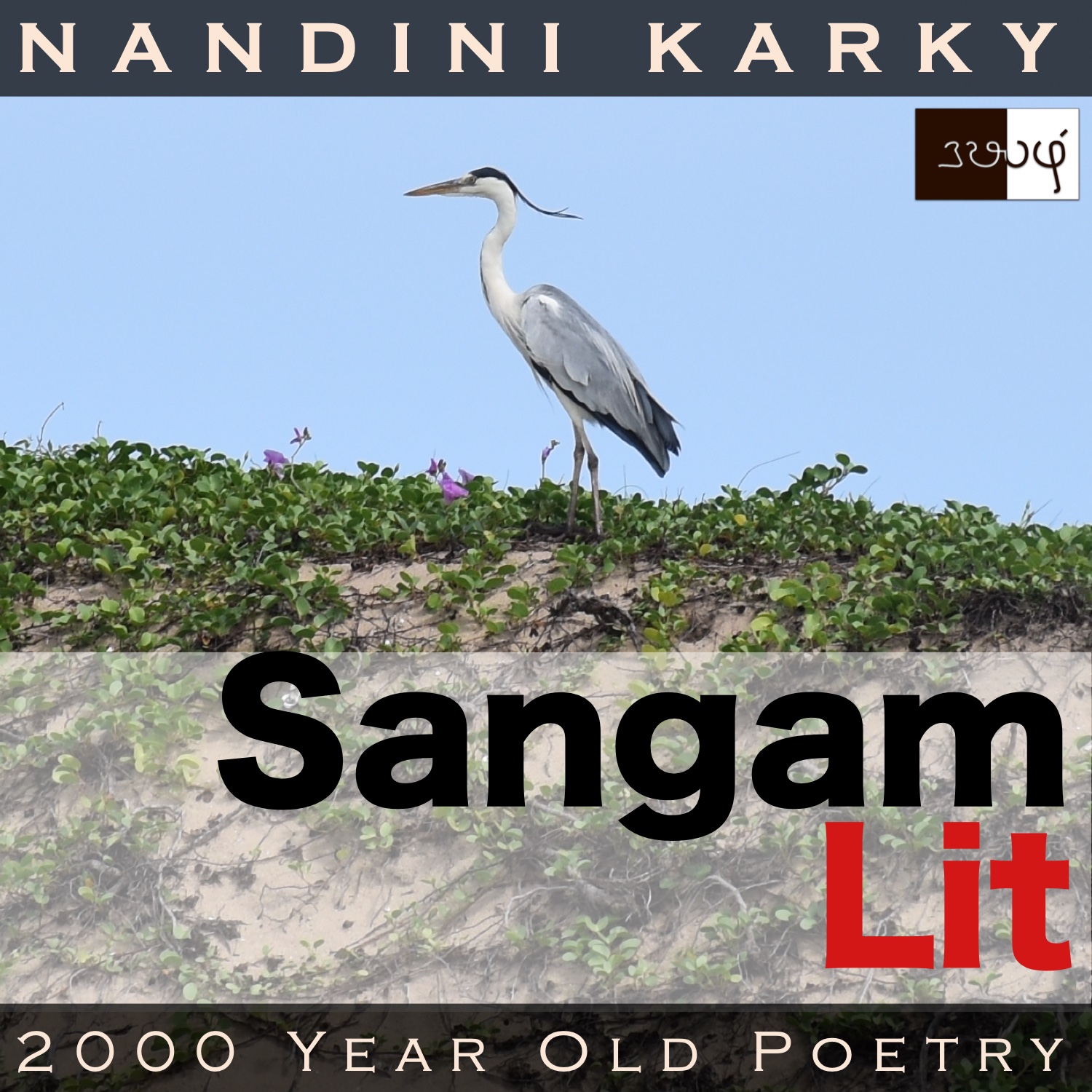Podcast: Play in new window | Download
Subscribe: Apple Podcasts | Spotify | Amazon Music | Android | iHeartRadio | TuneIn | RSS | More

In this episode, we reflect on honour in charity, as portrayed in Sangam Literary work, Kurunthogai 349, penned by Saathanaar. The verse is situated in the coastal regions of ‘Neythal’ and speaks in the voice of the lady to the confidante, passing on a pointed message to the man, listening nearby.
‘அடும்பு அவிழ் அணி மலர் சிதைஇய மீன் அருந்தி,
தடந் தாள் நாரை இருக்கும் எக்கர்த்
தண்ணம் துறைவற் தொடுத்து, நம் நலம்
கொள்வாம்” என்றி-தோழி!-கொள்வாம்;
இடுக்கண் அஞ்சி இரந்தோர் வேண்டிய
கொடுத்து ”அவை தா” எனக் கூறலின்,
இன்னாதோ, நம் இன் உயிர் இழப்பே?
‘Isn’t it worse than losing life itself?’ is the sharp question at the core here. The opening words ‘அடும்பு அவிழ் அணி மலர்’ talking about ‘the flowers of the beach morning glory’ bring to fore the oft-mentioned plant in the coastal regions, favoured by women for their striking purple blooms. Representing the kingdom of fauna appears ‘தடந் தாள் நாரை’ meaning ‘stork with curving legs’. In ‘இரந்தோர் வேண்டிய கொடுத்து’ meaning ‘giving what supplicants come seeking for’, there’s mention of charity, indicating the generous nature of the Sangam folks. Ending with the words ‘நம் இன் உயிர் இழப்பே’ meaning ‘losing sweet life’, the verse beckons us to listen and ponder.
It’s a quest to understand what could be worse than death itself. The context reveals that the man and lady were leading a married life, when the man took to keeping the company of courtesans. After a while, realising the mistake in his ways, the man returns home to his wife. Observing him nearby, but pretending not to notice him, the lady says to her confidante, “Trampling and ruining a beautiful flower blooming on the morning glory vine, the stork with curved legs feeds on fish in the sand dunes of the lord’s cool shores. O friend, you say to me, ‘Let’s besiege and ask him to return your good health and beauty’. Indeed, we can ask him for it. But after giving away something to those who come seeking, if, in fear of one’s own harsh times, we tell them, ‘give it back’, could even losing our sweet lives be more sorrowful than that?” With these words, the lady reveals to the listening man, her magnanimity and her acceptance, so as to indirectly fill him with regret about his thoughtless actions.
Time to delve into the nuances. The lady starts by talking about a spreading morning glory vine, bedecked with its prominent flowers. She points to how a particular stork seems to be stepping on one such flower, when it was feeding on fish, in the sands of the man’s domain. After ending that description, the lady relates to how the confidante had come to her and asked whether they should go and waylay the man, demanding that he return the health and beauty of the lady he took away in their courtship and marriage, because he seemed to be now preferring the company of courtesans. After repeating the confidante’s stance thus, the lady says, ‘Sure, that’s possible’, and then she extends it with a ‘however’. Turning to the confidante, she presents a hypothetical situation of a patron rendering gifts to a person who comes begging to them, and then later, when that patron finds himself in dire straits, consider if he were to go to that supplicant and ask them to return the gifts he rendered unto them earlier. The lady concludes with the question, isn’t that state worse than losing one’s life itself!
What’s etched in these words is the high esteem placed on an act of charity! In effect, the lady is saying, ‘once you give something to someone, it’s no more yours, and if, by any chance, you are thinking of going to them and asking them to return it, instead of that course of action, it’s better to die!’ This strong statement the lady links to her own situation and implies that she gave the man the gift of her health and beauty, which he relished. Now, it was not right to ask him to return that back to the lady, which apparently was something that a confidante did, when the man started erring in his ways and started neglecting the lady. In the scene of the stork stepping on the morning glory flower to eat the fish, the lady places a metaphor for her situation of how the man stepped on her happiness so as to savour the company of the courtesans. Although the lady seems to be gently stopping her friend from questioning and embarrassing the man, internally, she’s showing the man what an honourable response to dishonourable actions is! A verse that sketches the high code of ethics in the ancients, something that informs us even today about the nuances in giving a gift and letting it go!




Share your thoughts...